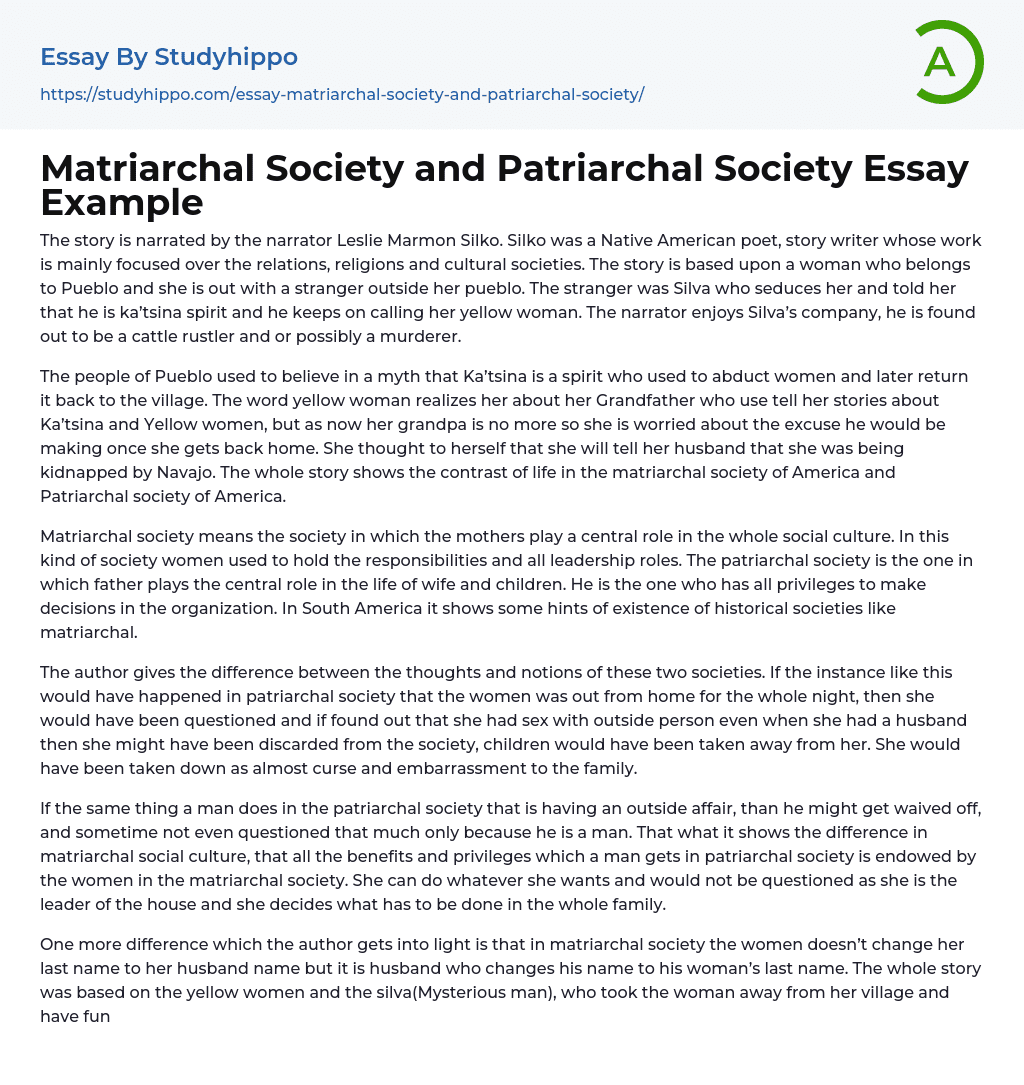

Matriarchal Society and Patriarchal Society Essay Example
Leslie Marmon Silko, a Native American poet and storyteller, serves as the narrator of this story. Through her work, Silko delves into themes such as relationships, religion, and cultural societies. The narrative revolves around a woman belonging to the Pueblo tribe who discovers herself outside her pueblo alongside an unfamiliar individual named Silva. Silva asserts himself as a ka’tsina spirit and consistently addresses the woman as "yellow woman." Despite enjoying Silva's companionship, it becomes evident that he could be implicated in acts of cattle rustling or potentially even murder.
In the past, the people of Pueblo believed in a myth surrounding Ka'tsina, a spirit who would take women and bring them back to the village. The protagonist, known as "Yellow woman," recalls her grandfather's tales about Ka'tsina and Yellow women. However, with her grandfather now deceased, she is conce
...rned about his potential reaction upon her return home. As she discusses the situation with her husband, she contemplates using being kidnapped by the Navajo as an explanation. This narrative sheds light on the contrasting values between America's matriarchal and patriarchal societies.
A matriarchal society is characterized by mothers being the primary figures in leadership roles and responsibilities, while patriarchal societies have fathers as central figures with authority over their wives and children. Some regions in South America have historical societies that demonstrate matriarchal tendencies.
The author explores the contrasting perspectives and principles of two cultures. In a society where men have authority, women who spend nights away from their homes would face scrutiny. If it was revealed that they engaged in sexual activities outside of marriage, society might exclude them an
separate them from their children. Their actions would be deemed dishonorable and bring shame to their families.
In patriarchal societies, men face no serious consequences or questioning for engaging in extramarital affairs due to their gender. This differs from matriarchal cultural norms, where powerful women grant men the same privileges found in patriarchal societies. In a matriarchal society, the female head of the household has the freedom to make decisions for the entire family without facing scrutiny.
In a matriarchal society, women retain their own last names while husbands adopt their wife's surname. The author explores this distinction and weaves it into the tale of Yellow Woman and Silva. Silva, an enigmatic figure, leads Yellow Woman on a captivating escapade away from her village. Eventually, he leaves her by the river to navigate her way back home independently. This narrative mirrors mythical elements found in matriarchal cultures.
- Book Summary essays
- Metaphor essays
- Reader essays
- Rhyme essays
- Literary devices essays
- Villain essays
- Books essays
- Genre essays
- Literary Criticism essays
- Writer essays
- Protagonist essays
- Simile essays
- Poem essays
- Book Report essays
- Book Review essays
- Greek Mythology essays
- Plot essays
- Tragic Hero essays
- Coming of Age essays
- Play essays
- Rhetoric essays
- Rhetorical Question essays
- Translation essays
- Understanding essays
- Reason essays
- Character essays
- Letter essays
- American Literature essays
- Literature Review essays
- Utopia essays
- Poetry Analysis essays
- Dante's Inferno essays
- Between The World and Me essays
- Incidents in The Life of a Slave Girl essays
- Flowers for Algernon essays
- Myth essays
- Everyday Use essays
- Boo Radley essays
- Genesis essays
- Richard iii essays
- Alice in Wonderland essays
- On the road essays
- Ozymandias essays
- The Nightingale essays
- Holden Caulfield essays
- Animal Farm essays
- 1984 essays
- A Hanging essays
- Shooting An Elephant essays
- A Tale Of Two Cities essays



